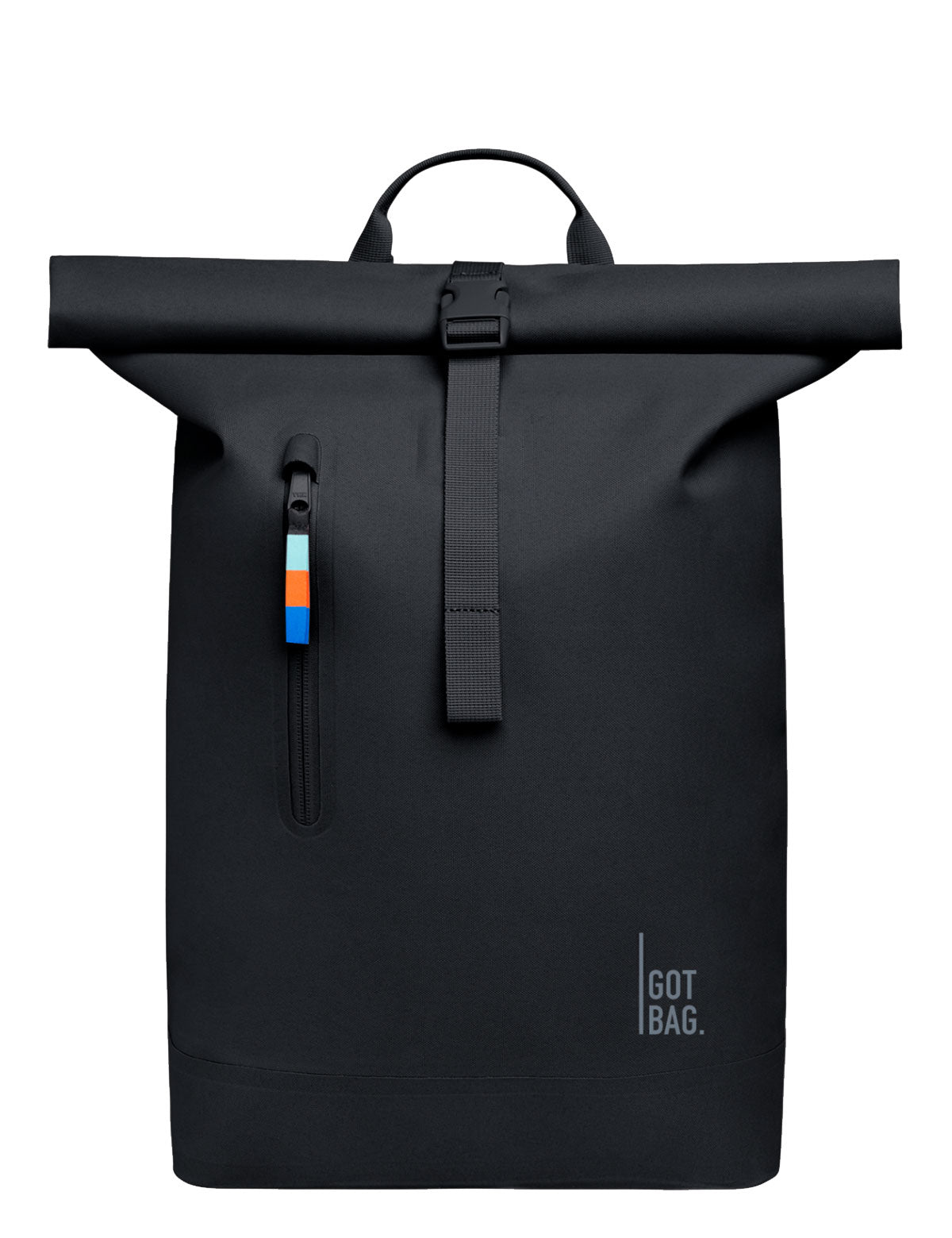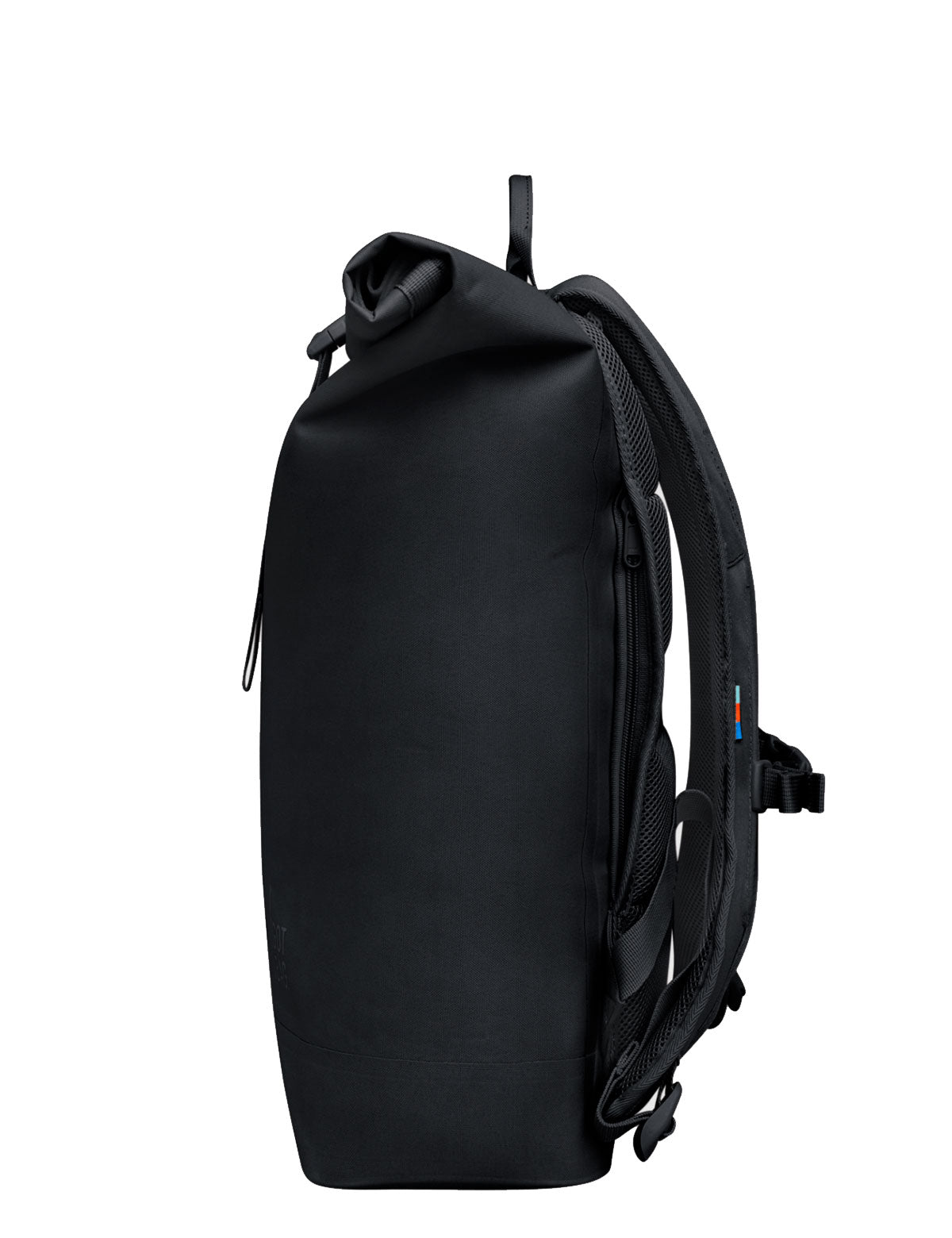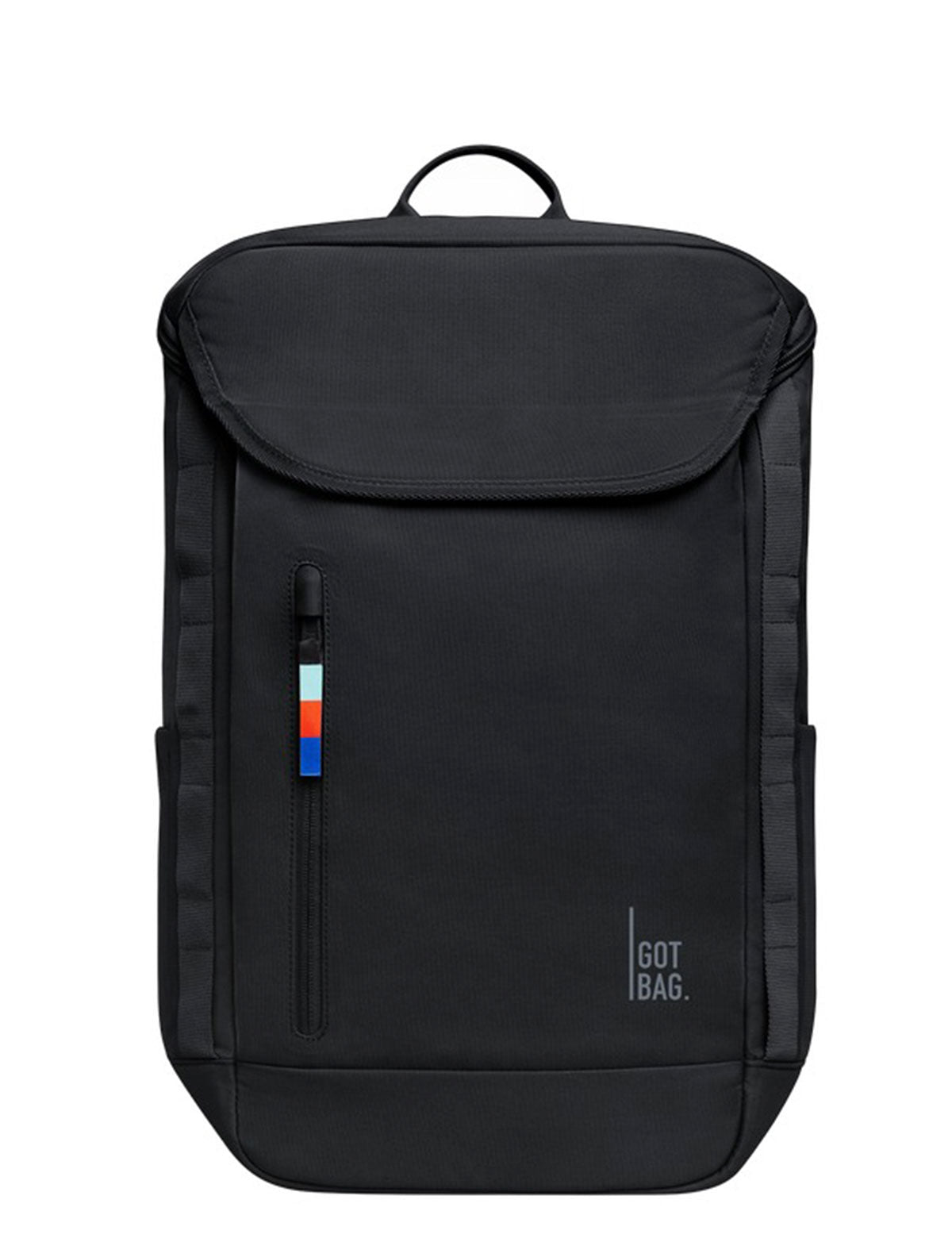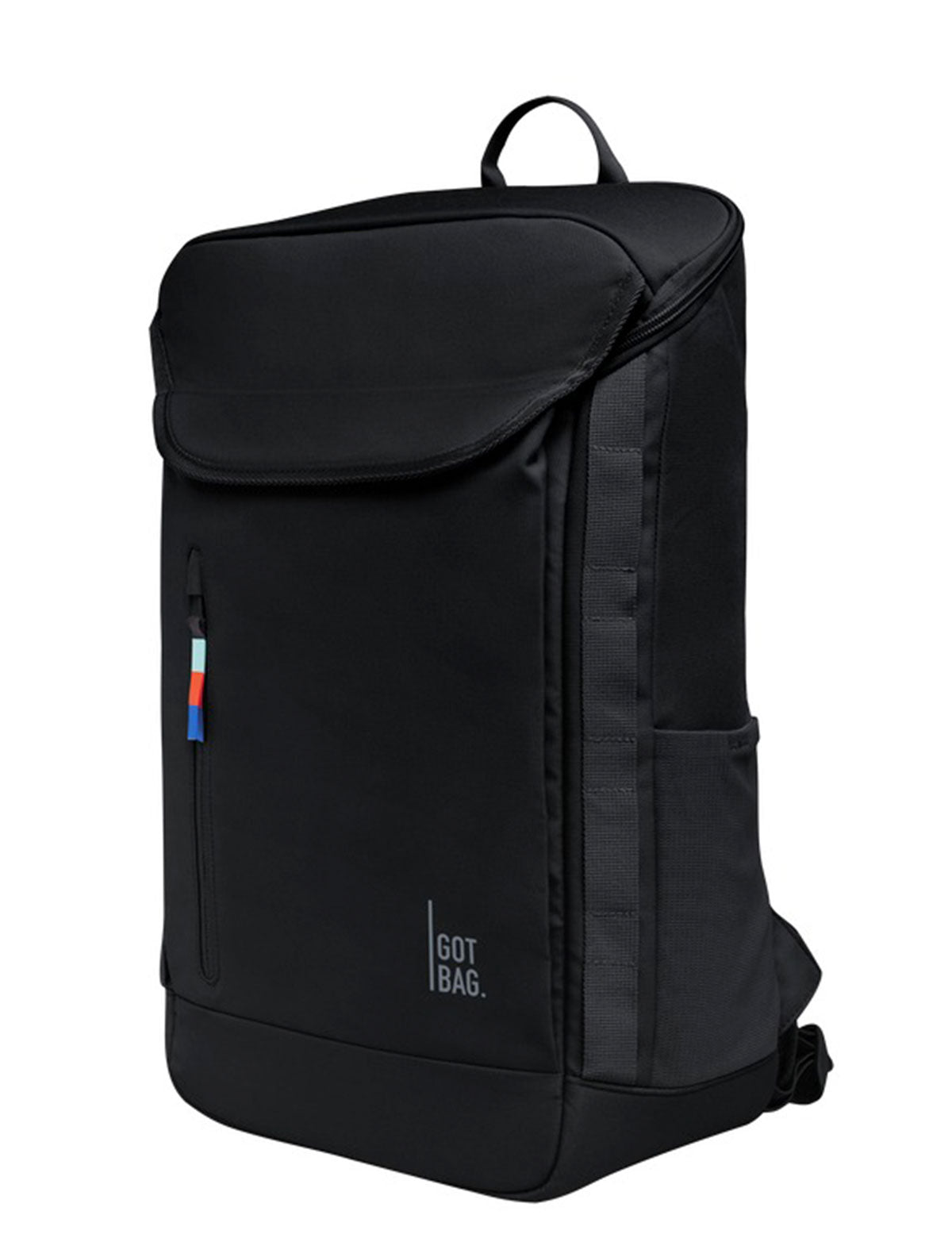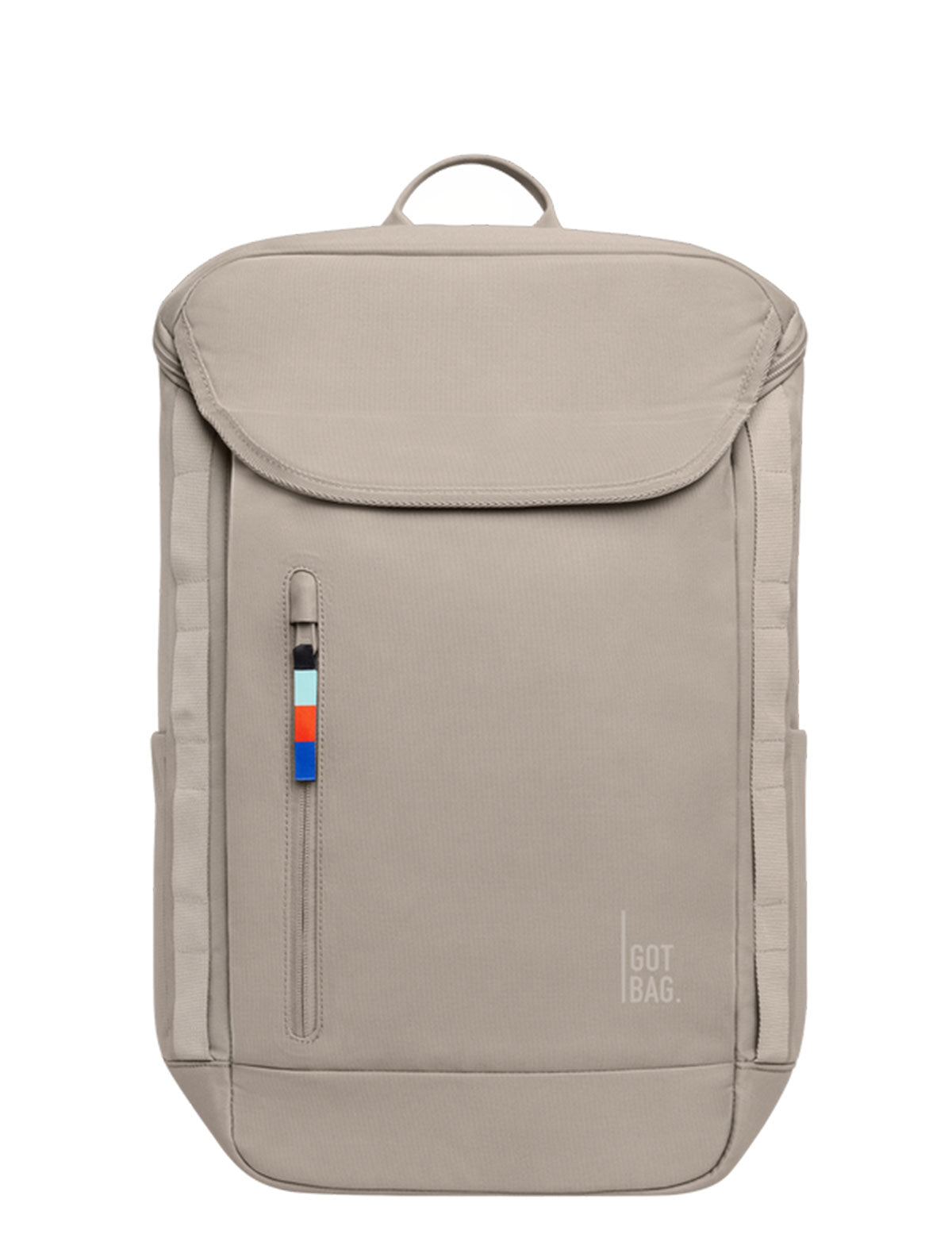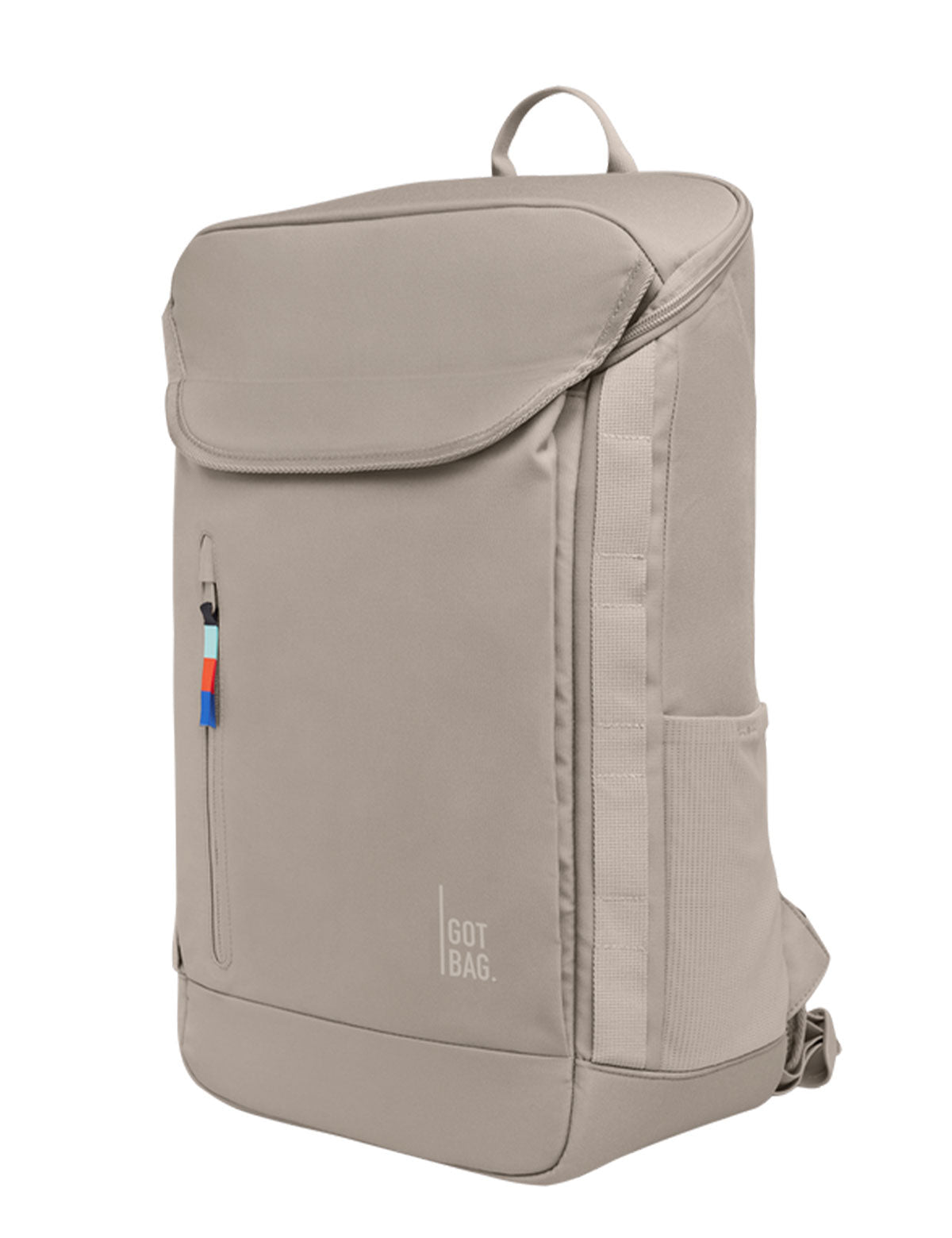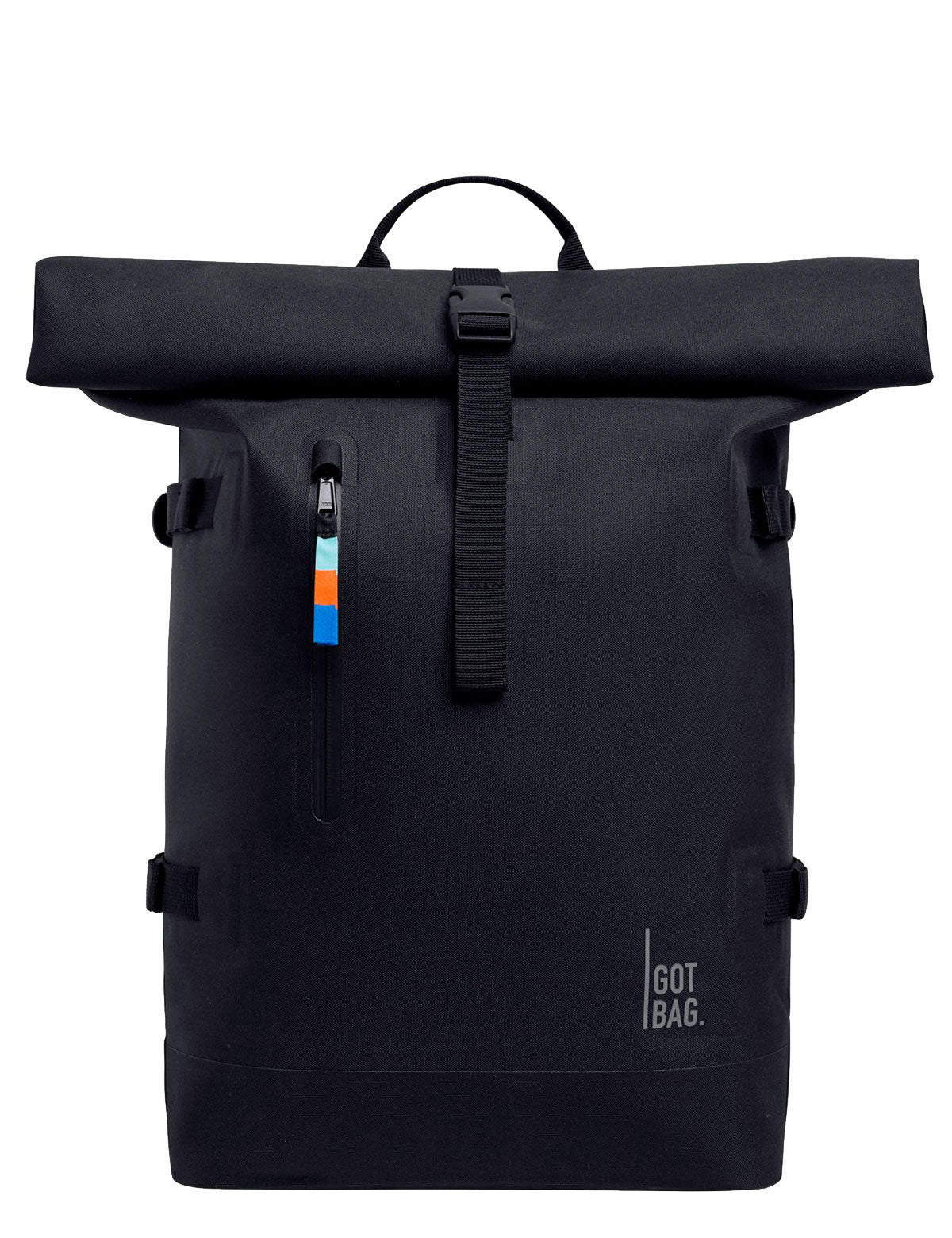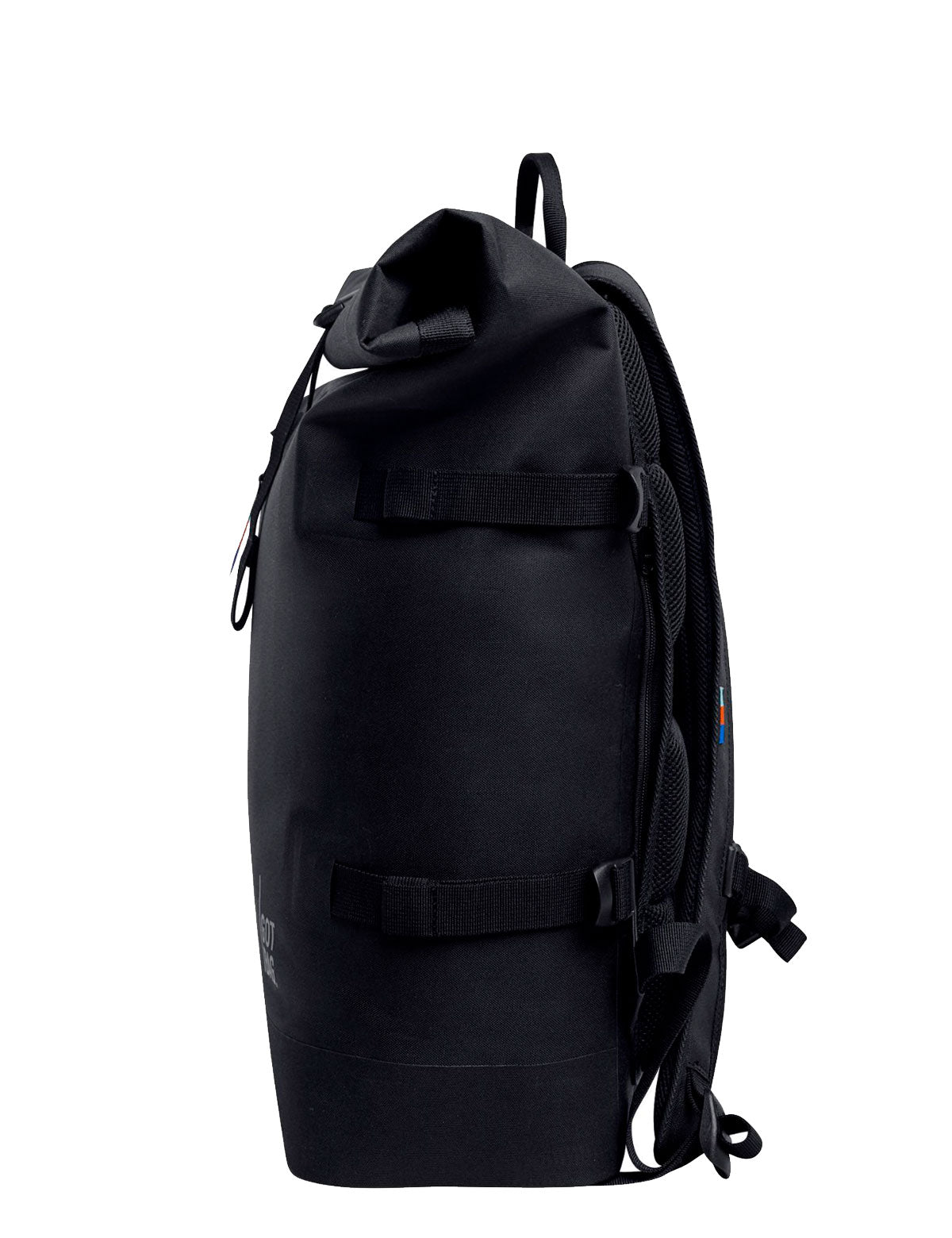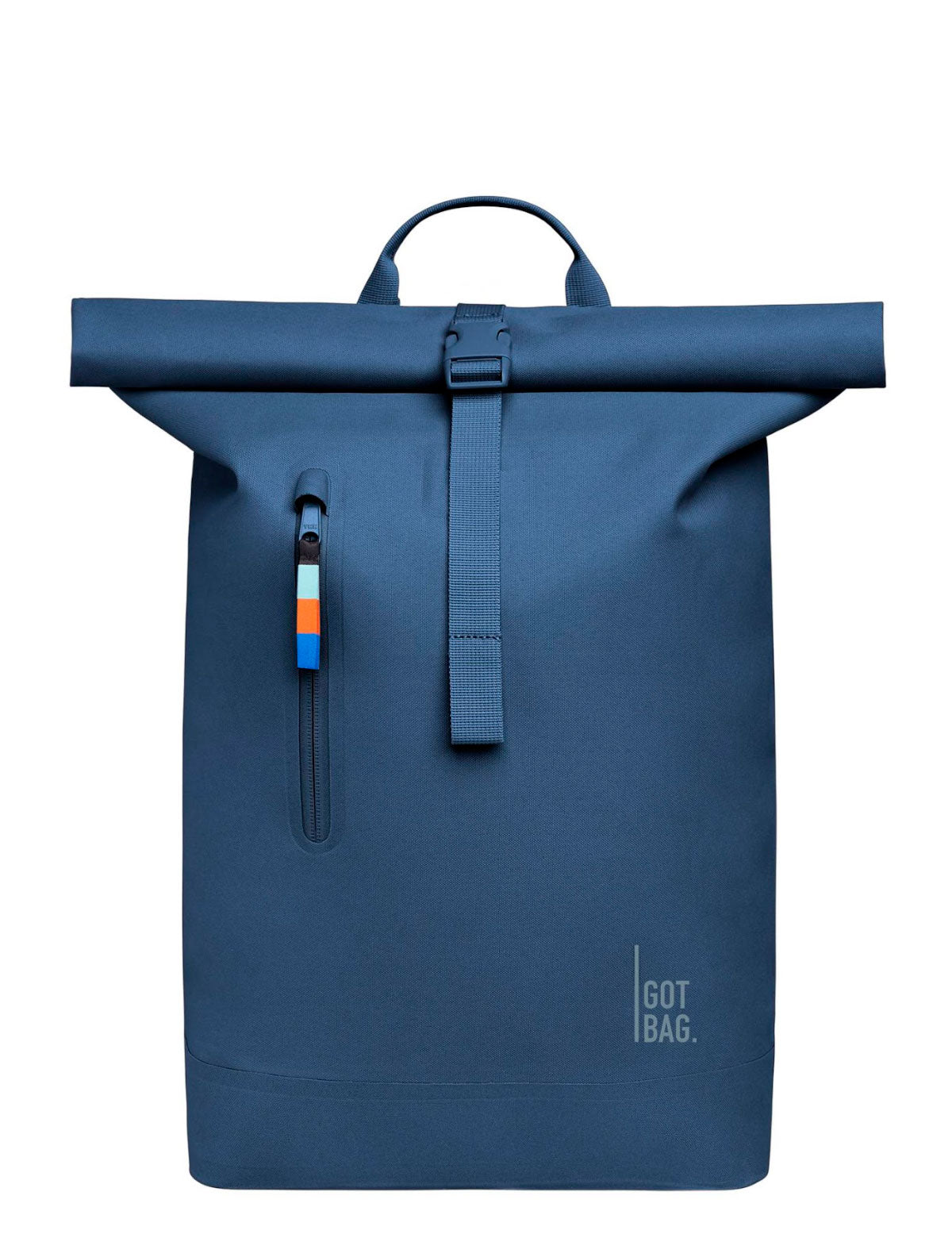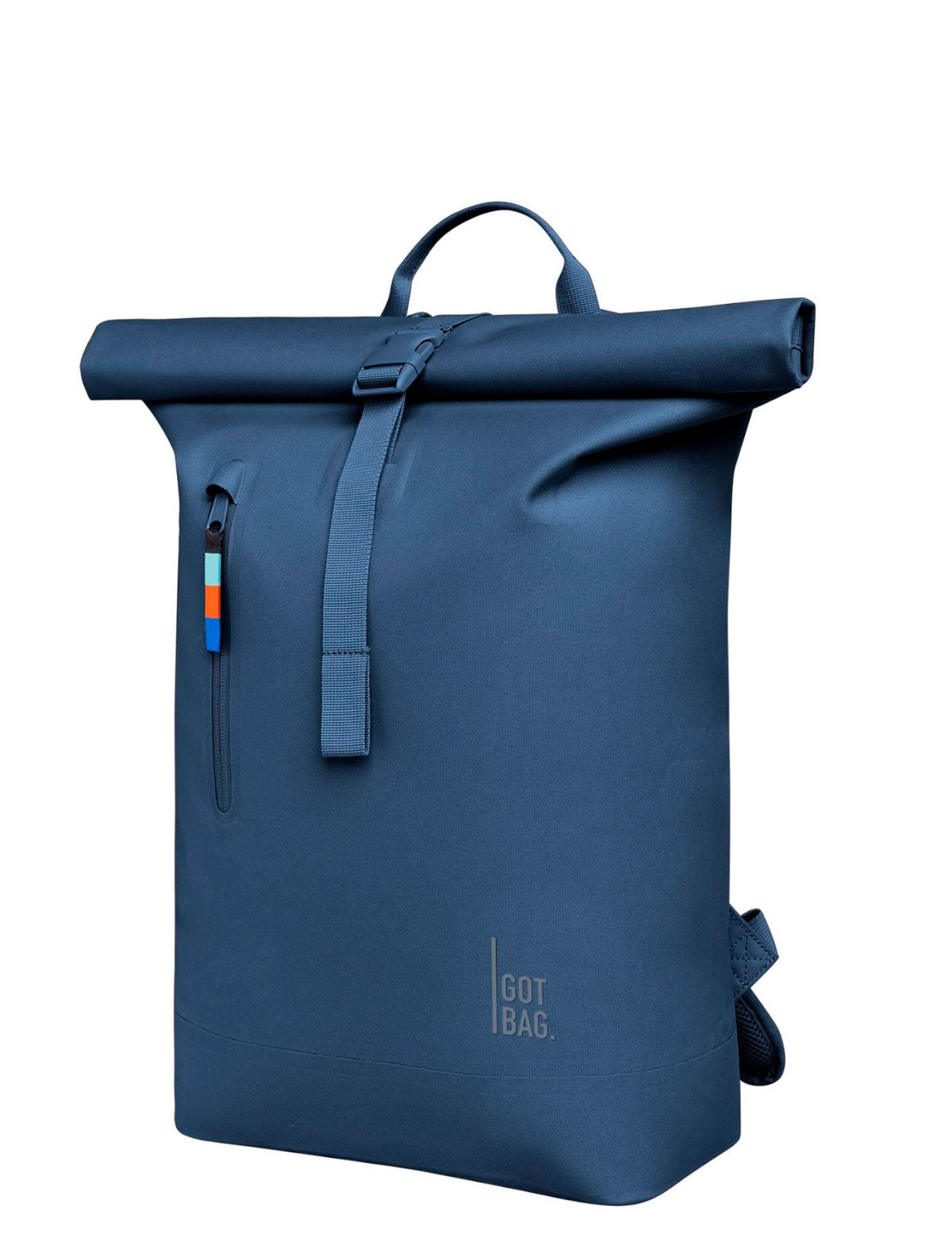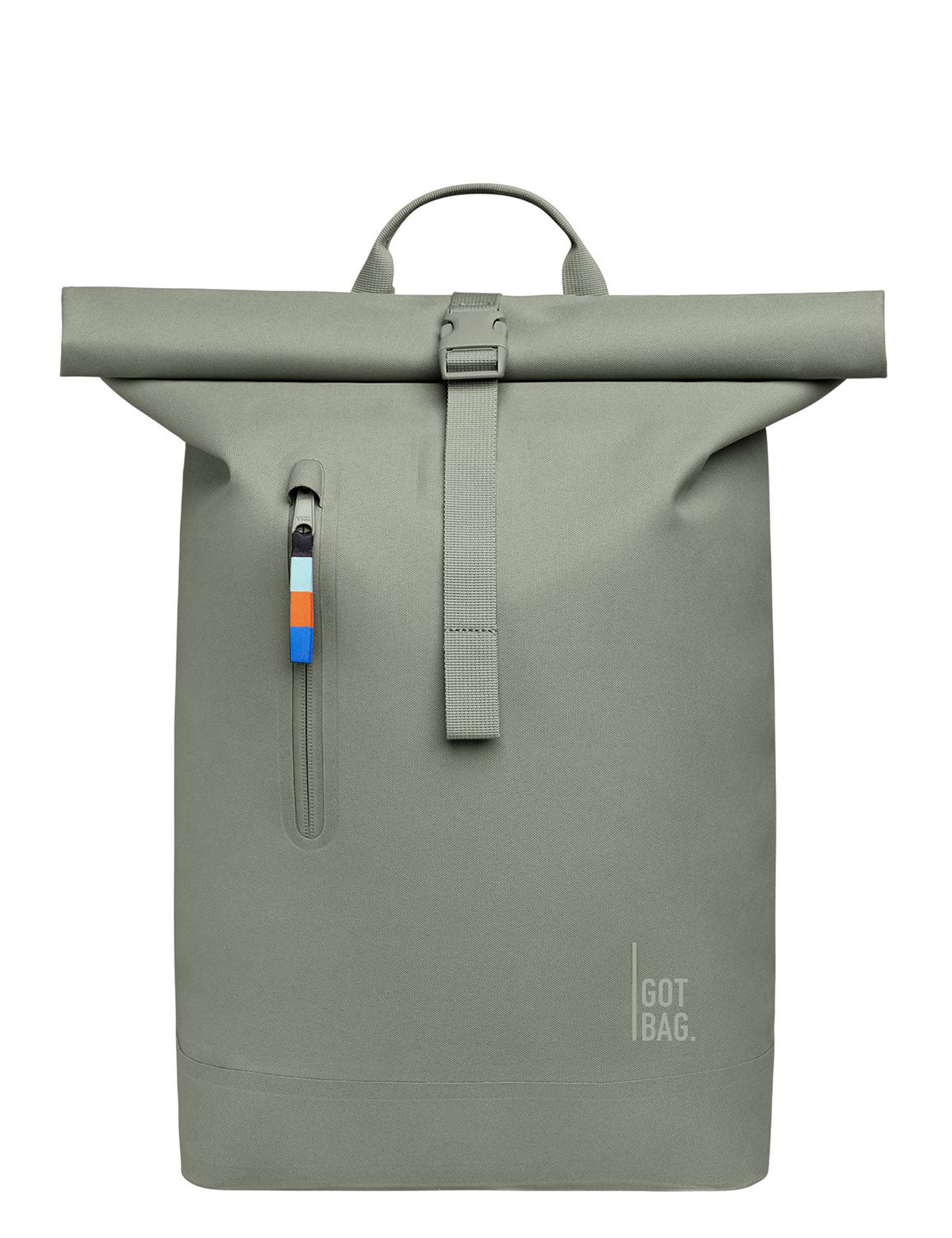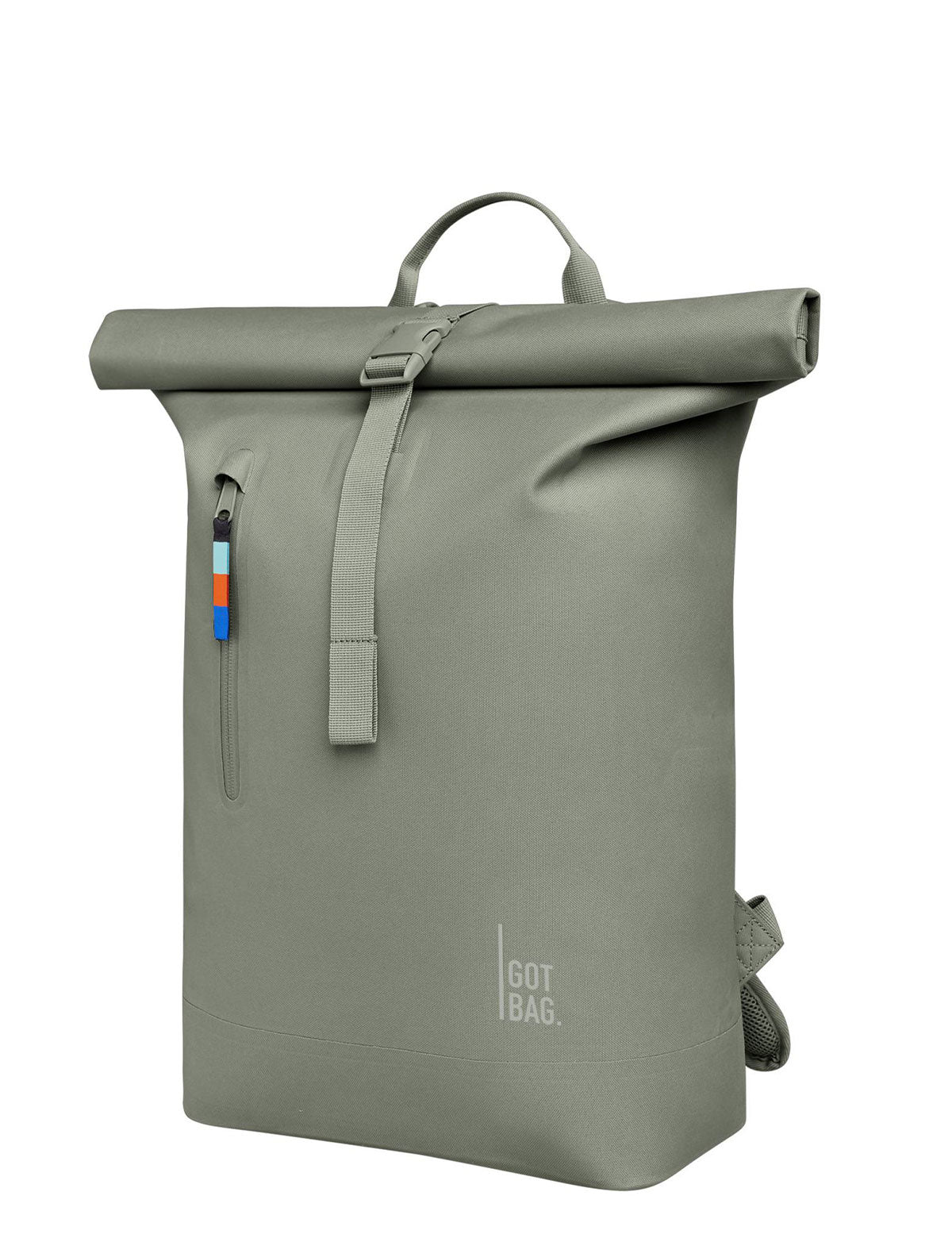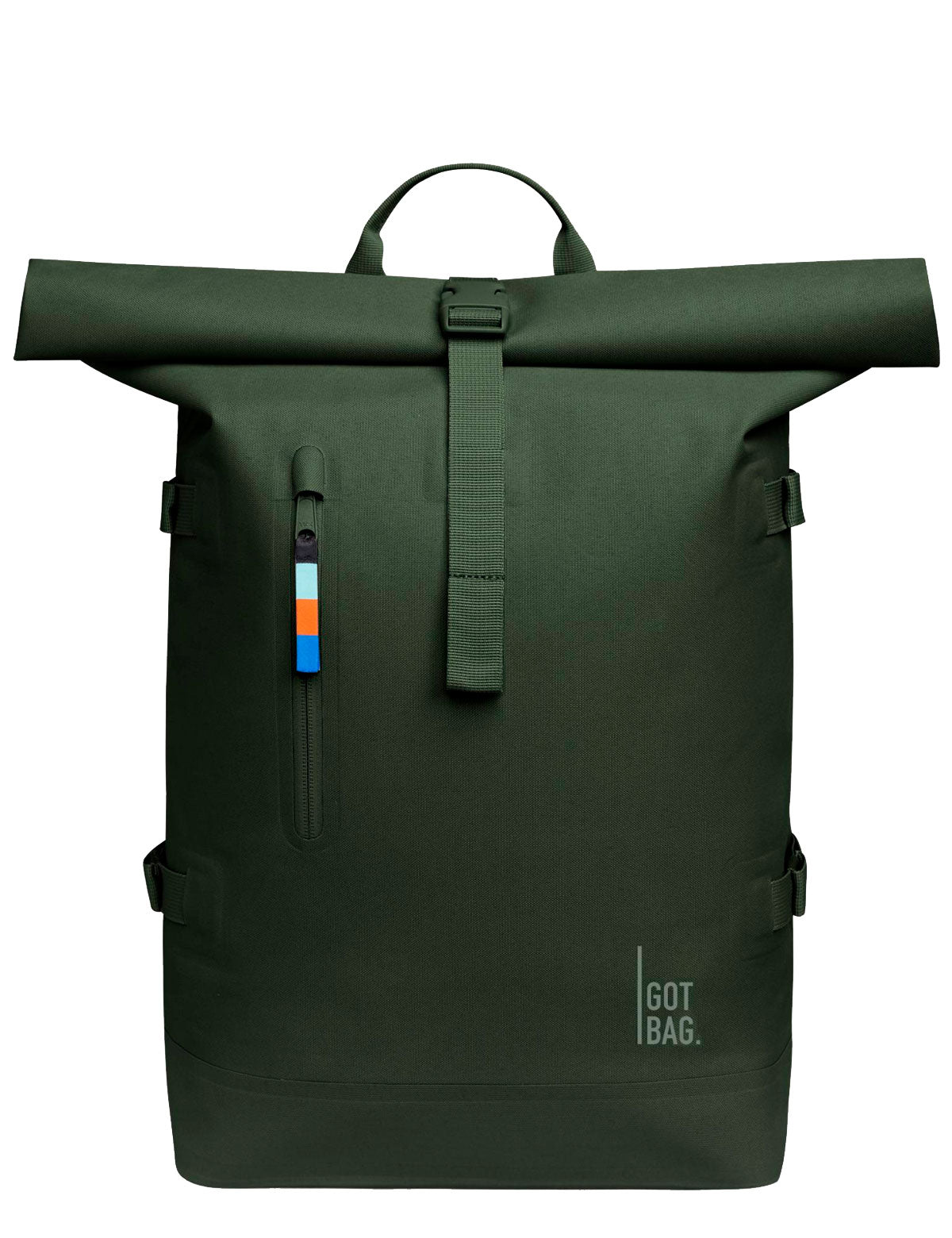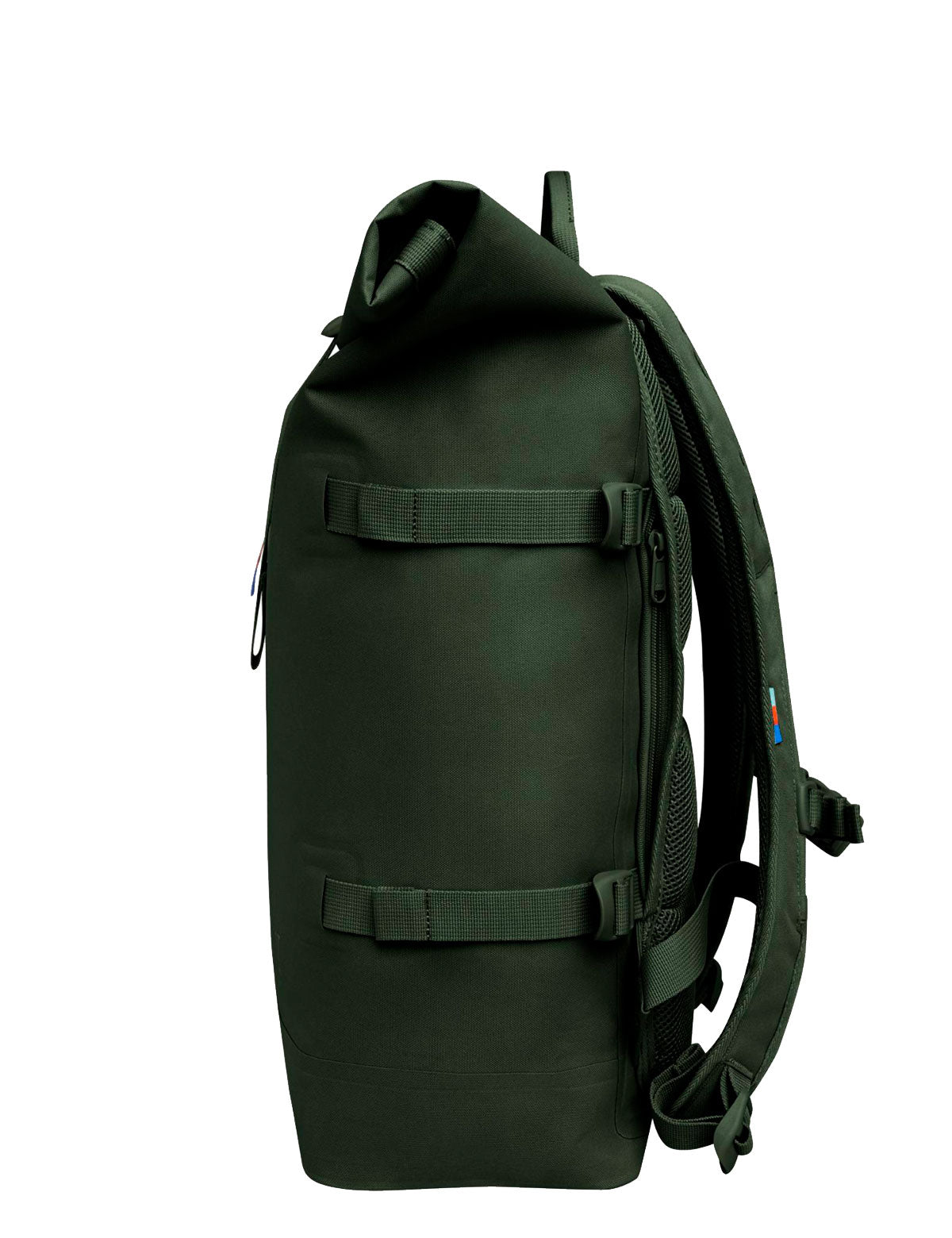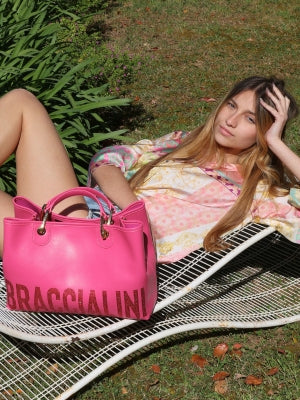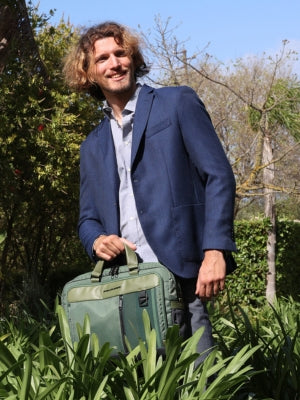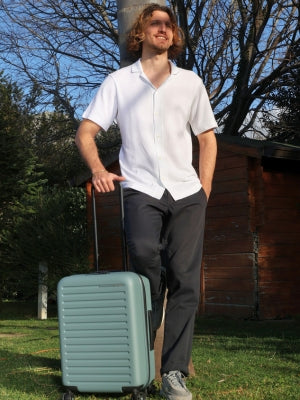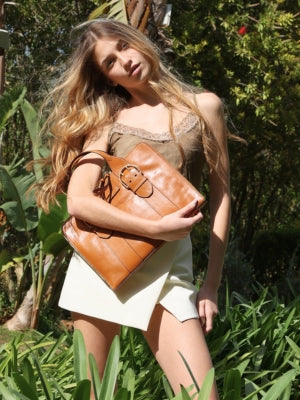
Following his passion for water sports, Benny , the founder of Got Bag , decides to fight against ocean plastic pollution by creating backpacks with recycled plastic waste from the Indian Ocean. In 2016, he decides to develop the iconic GOT BAG ROLLTOP, the first backpack in the world made of ocean plastic ( Ocean Impact Plastic ).
In parallel, the company has launched a clean-up program in Demak, on the island of Java in Indonesia, collecting plastic from both the ocean and coastal areas. With its work, Got Bag raises awareness among people around the world about the responsible use of natural resources, thanks to an innovative model of circular economy with a positive impact on people and the environment.
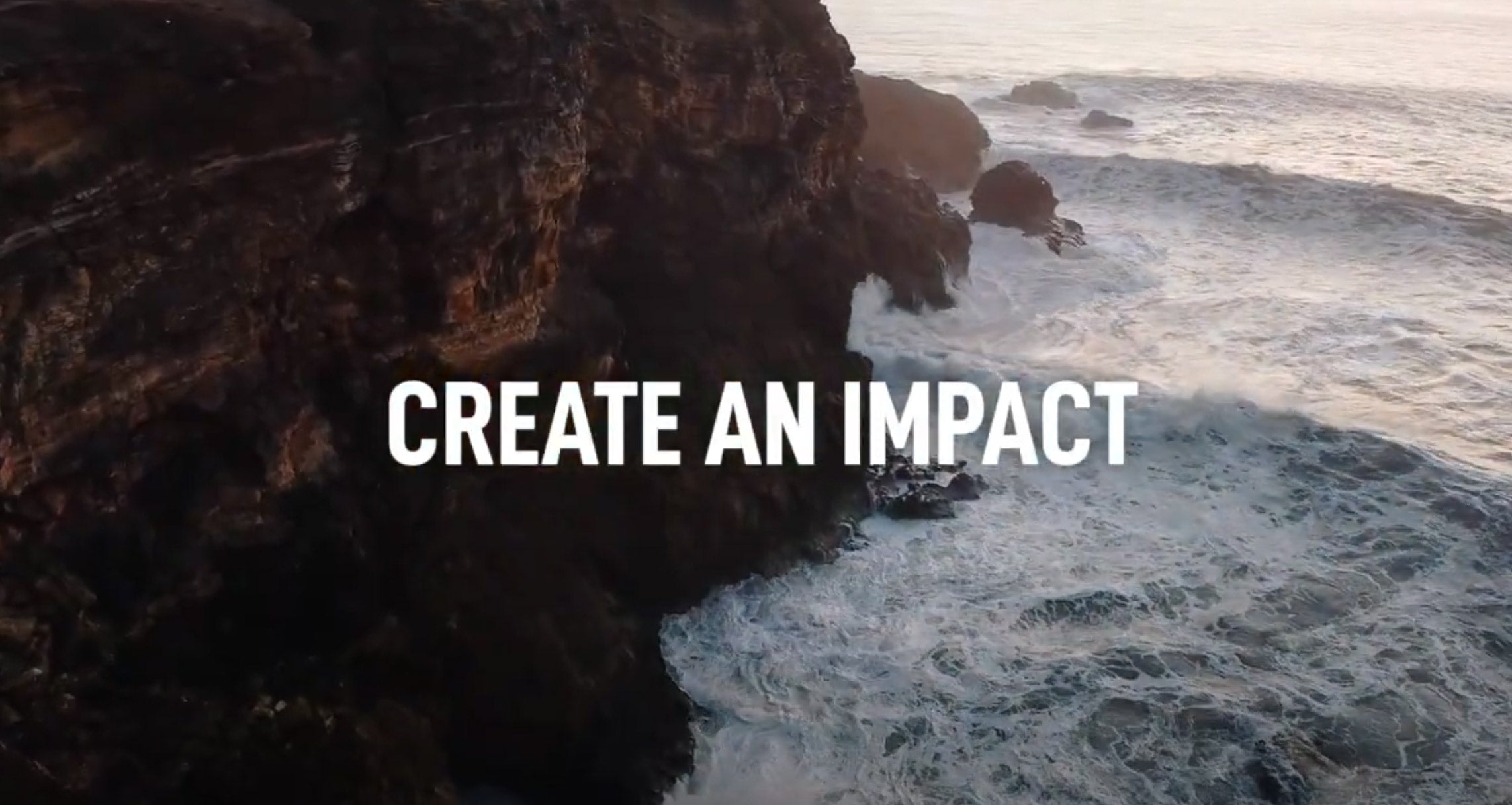
Of the new plastics produced worldwide, approximately 9% are recycled, 12% are incinerated, and 79% end up in nature. Here's what we can do:
1
produce and use less plastic
2
improve waste management and recycle more
3
launch programs to collect plastic dispersed in the environment
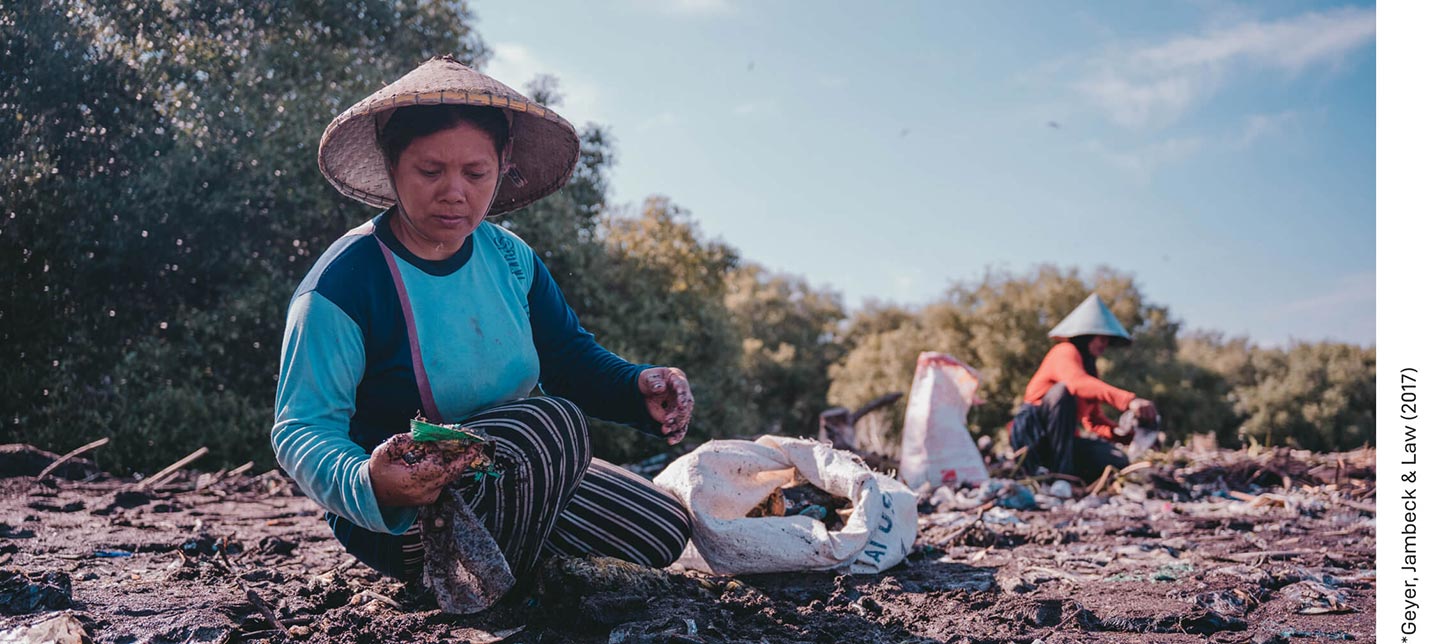
Why does so much plastic end up in the oceans of Southeast Asia?
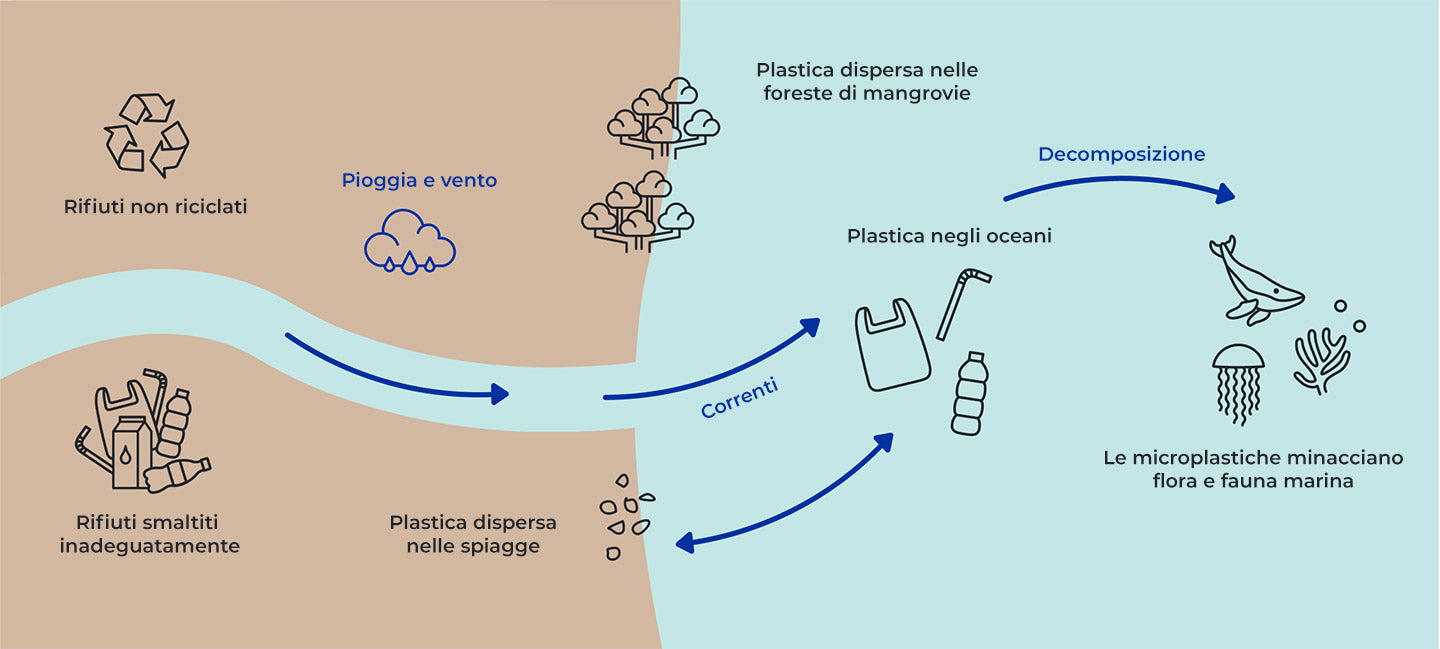
Indonesia produces one-fifth of the waste that an American citizen produces every day, and plastic represents at least 10%. In addition, there is plastic waste that, instead of being disposed of and recycled directly in Europe or the United States, is exported to Southeast Asia and without being officially tracked.
Depending on the size of a country's population, the percentage of waste that is lost to the environment varies depending on the level of industrialization and education, the number of people living near the coast, infrastructure, and geographical factors such as climate, topography, and vegetation. Jambeck et al. (2015) estimate that in Indonesia this percentage is around 83%, while in industrialized countries such as the United States it is only around 2%. Thus, after China, Indonesia is the country with the most plastic entering the oceans worldwide: up to 1.29 million tonnes per year. In the United States, however, it is just 0.11 million tonnes per year. Regardless of location, just under half of all improperly disposed waste eventually ends up in the oceans – according to Jambeck et al (2015) – particularly waste generated by people living within 50 km of the coast .
The approach
What is Got Bag doing?
In 2016, Got Bag began collecting and recycling plastic from the oceans, turning it into backpacks. Since then, they have steadily increased the capacity of their cleanup program and therefore the amount of plastic collected each month. In addition to this, they are continuously increasing their social commitment by promoting awareness and prevention activities on site to reduce the amount of plastic waste improperly disposed of and thus prevent it from ending up in the oceans.
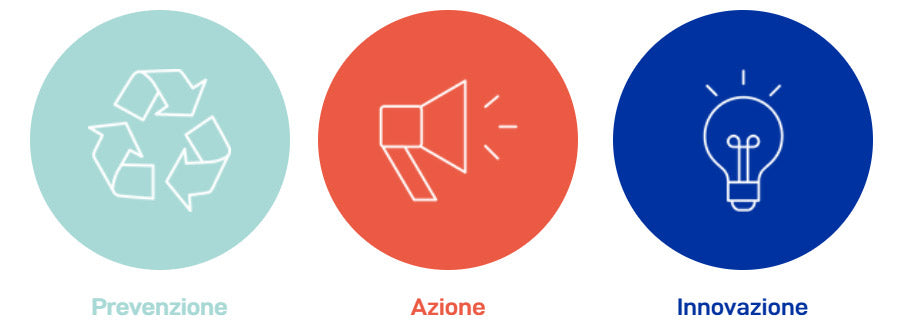
The activity in Indonesia
In 2016, Got Bag began collecting and recycling plastic from the oceans, turning it into backpacks. Since then, they have steadily increased the capacity of their cleanup program and therefore the amount of plastic collected each month. In addition to this, they are continuously increasing their social commitment by promoting awareness and prevention activities on site to reduce the amount of plastic waste improperly disposed of and thus prevent it from ending up in the oceans.
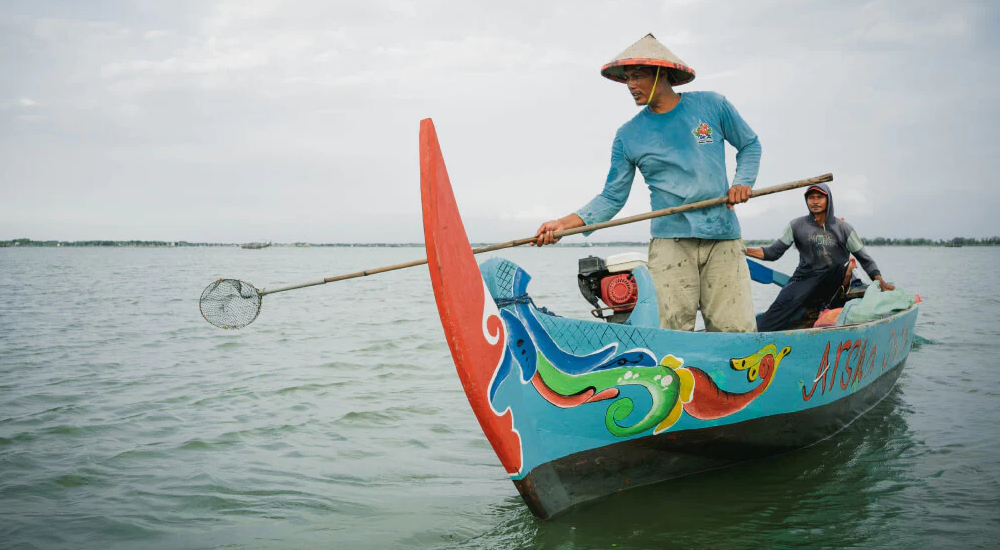
The amount of plastic collected directly from the ocean by a network of over 2,000 fishermen and women on the northern coast of Java has been steadily increasing since Got Bag began its cleanup operation in 2016. The company has also started collecting plastic from land, which has been dispersed into the environment due to lack or inadequate waste management systems. Collection points cover large areas starting from the coasts, thus offering the population a direct opportunity to recycle, also thanks to prevention activities promoted directly on site.
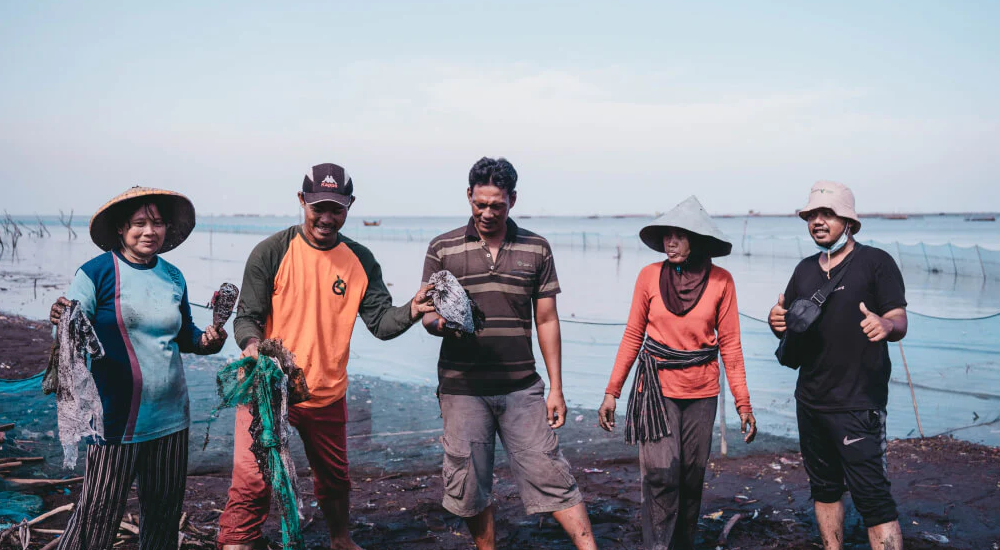
People who are part of the clean-up program become ambassadors for the initiative, spreading and disseminating information about recycling and the negative effect of plastic waste in the ocean, and raising awareness among their fellow citizens about a more conscious use of products made from plastic. This phenomenon also stimulates relationships with the local government, favoring the search for long-term solutions to preserve the marine ecosystem.
What is Ocean Impact Plastic?
The collected material is called Ocean Impact Plastic , to symbolize that from now on it will no longer be considered a threat to the oceans, also thanks to the collection activities of the Got Bag community. It is composed of plastic collected directly from the ocean and from the surrounding areas with collection centers, from mangrove forests and rivers.
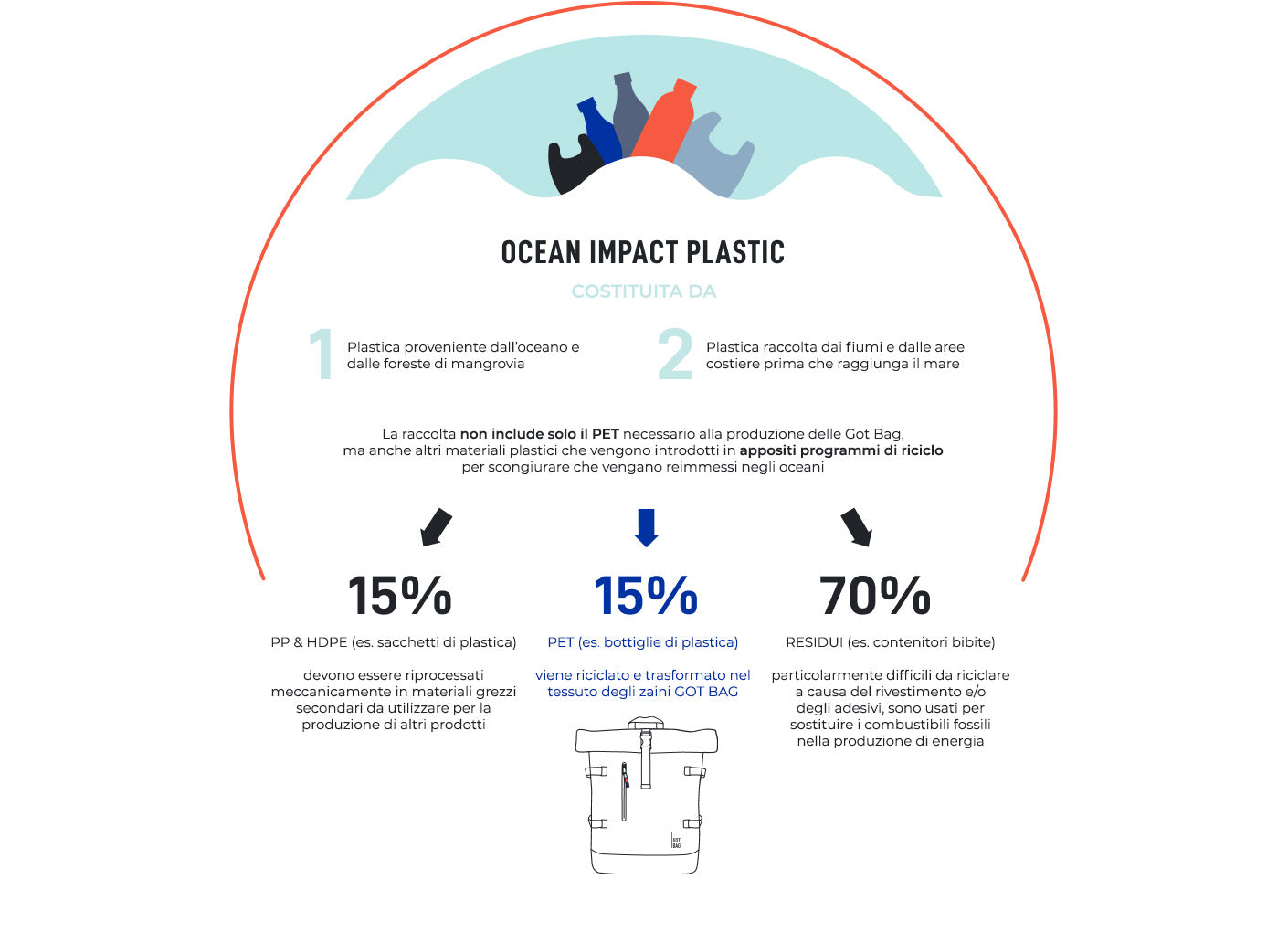
Turning waste into treasure
In 2016, Got Bag began collecting and recycling plastic from the oceans, turning it into backpacks. Since then, they have steadily increased the capacity of their cleanup program and therefore the amount of plastic collected each month. In addition to this, they are continuously increasing their social commitment by promoting awareness and prevention activities on site to reduce the amount of plastic waste improperly disposed of and thus prevent it from ending up in the oceans.
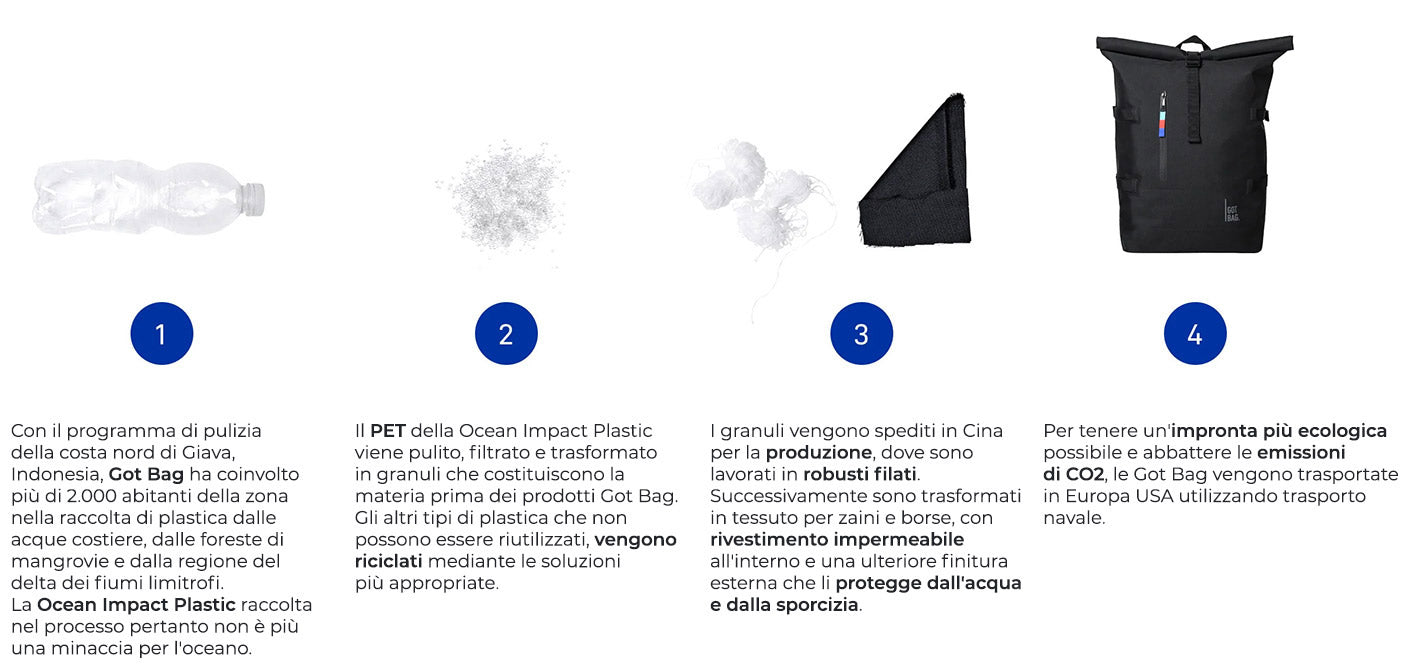
Transport of Got Bag products
Since plastic pollution and its consequences mostly affect the Indian Ocean, we collect Ocean Impact Plastic in Indonesia. The material is then transported to China, which is strategically located between Indonesia and Europe, and processed by world-leading companies in the processing of this type of fabric.
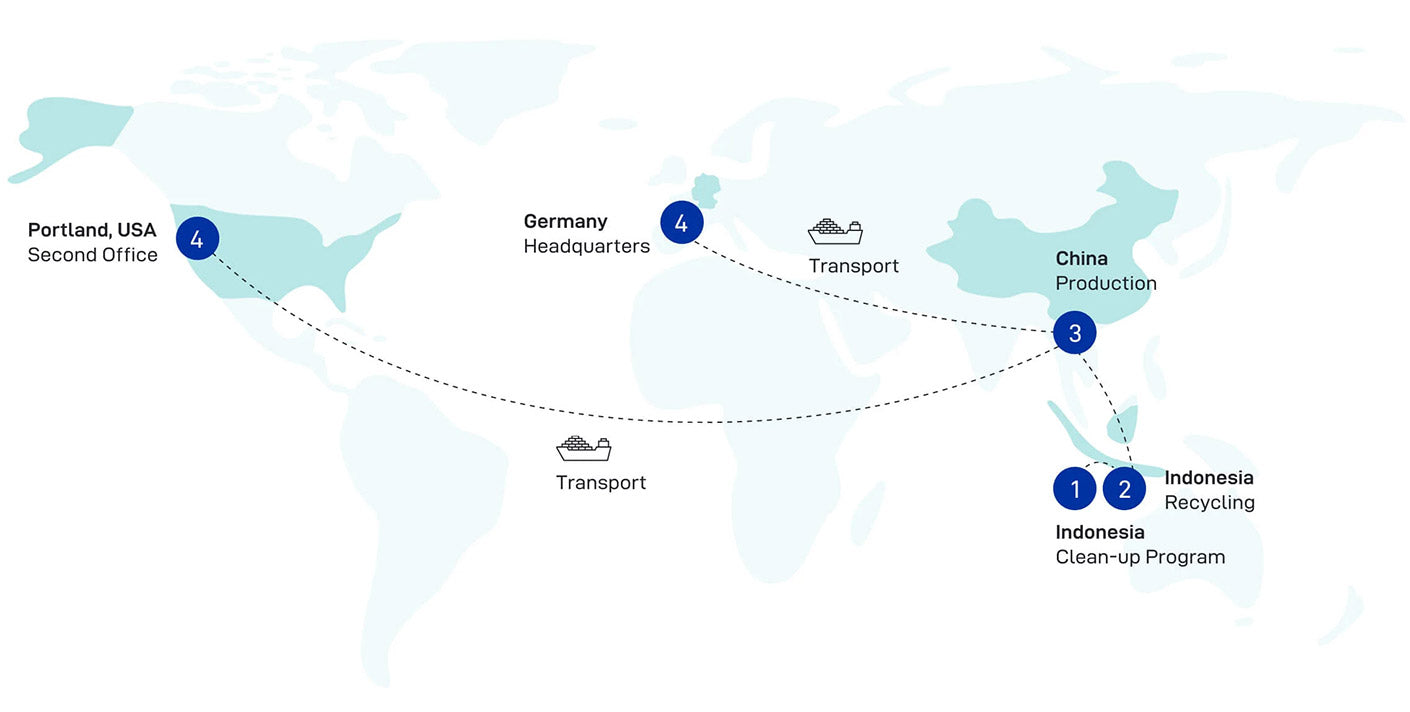
Future goals and plans
Plastic collection and supply
Types of recycled plastics - Goal: Recycle as much plastic as possible
Types of recycled plastics - Goal: Recycle as much plastic as possible
Got Bag wants to free the oceans from plastic waste, which is why all plastic waste that can harm the environment is collected, regardless of its shape and type. Not only are the easily recyclable - and therefore also economically valuable - parts selected, but as much plastic waste as possible is also removed. Accordingly, it is necessary to separate the collected plastic waste. Our specialized recycling partners process the PET into rPET (recycled PET), which we generally use 10-15% of the Ocean Impact Plastic. The other types of plastic, such as PP and PA (polypropylene and polyamide), are given to other recyclers, as they cannot be used in the production of Got Bag. There are a number of reasons for this: some materials are not suitable for making new products due to their properties, others do not have a sufficient degree of purity, and finally, quite high minimum purchase quantities are often required for recycling, and Got Bag is currently unable to meet these requirements. A high percentage of Ocean Impact Plastic is not recyclable with current technologies: these are, for example, composite materials that contain different materials, which cannot be separated. This plastic is currently used in thermal recycling for energy production. Got Bag is in constant contact with various partners and the scientific community in order to find the best possible alternatives to recycle these plastic materials.
Transport - Target: only sea and rail transport
Transport - Target: only sea and rail transport
Got Bag tries to keep the CO2 emissions from the transport of raw materials and products as low as possible and completely offset the rest. To do this, sea or rail transport is preferred, as they produce lower emissions in relation to the cargo volume. These connections are slower than air transport, conditions that have also been aggravated by the recent pandemic, which is why the supply of products has often not been able to meet all requests. A part of the products directed to Europe and the United States in recent months has therefore been transported by road or air connections, the share has always been less than 5% of the total supply volume and recently this share has been reduced to under 1%. Through some process improvements, Got Bag intends to completely eliminate these shipments. Couriers are used for the shipment of some product samples, although they are also trying to reduce this share by implementing digital services via the web.
Scalability - Goal: Expand the waste management system
Scalability - Goal: Expand the waste management system
Got Bag, to cope with the increase in product demand and honor its mission, constantly increases the capacity of its clean-up program. In respect of the social impact of its work, Got Bag does not seek to compete with existing waste management facilities, but to create new ones in places where there is a greater shortage. This, combined with the fact that it aims to collect and recover all types of plastic, involves a high level of complexity because the need for PET is not fully covered by collection activities. To ensure continuous production, Got Bag uses plastic material supplied by some partners with Ocean Bound Plastic (OBP) certification, to meet the requirements of Ocean Impact Plastic.
Products
Products made with different plastic materials - Objective: to use other plastic materials in addition to PET from Ocean Impact Plastic
Products made with different plastic materials - Objective: to use other plastic materials in addition to PET from Ocean Impact Plastic
For the production of Got Bag products, currently only the part of PET separated from Ocean Impact Plastic is used, the other plastic materials cannot be used because they are not recyclable unless huge economic efforts are made, however Got Bag is committed to innovating production processes in order to expand the types of plastic materials used in its products in the long term. Product development therefore does not consist in the simple design of new models, but also in the continuous process of improving the accessories they are equipped with. For example, together with the partner HolyPoly, they are developing a special production equipped with rPP buckles.
Percentage of recycled materials - Target: 100%
Percentage of recycled materials - Target: 100%
Got Bag's main goal is to completely eliminate the percentage of virgin plastic used in the production of its products, however for some accessories or elements this is not yet possible. Some components such as buckles, padding and zippers, for example, are not currently available in recycled materials; for some accessories alternatives have already been tested, which unfortunately did not meet the required functionality or durability requirements. The company is committed to constantly innovating and testing various options and has some active pilot projects on this front.
Product Repair/Recovery - Goal: 100%
Product Repair/Recovery - Goal: 100%
According to their philosophy, Got Bag products should be used as long as possible, which is why the durability and resistance of the materials, as well as their repairability, are central features in the development, to increase the longevity of the products.
The processing of Ocean Impact Plastic as a raw material is quite demanding and the resulting fabric is not free of imperfections. Got Bag products therefore appear to deteriorate a little faster than similar products made from virgin materials, but they still retain their functionality perfectly.
Circular Economy - Objective: Contribute to a circular economy
Circular Economy - Objective: Contribute to a circular economy
Got Bag's motto is "From Trash to Treasure", which puts them at the heart of the circular economy: Got Bag products are an alternative made from existing raw materials to traditional backpacks and bags made from virgin plastic. To extend the life cycle, it is essential that the materials used and the finished products are as functional and timeless as possible, and therefore particularly durable, so that recycled plastic waste does not end up (again) in the oceans. The products come with a two-year warranty and repairing them during this period increases their life cycle.

